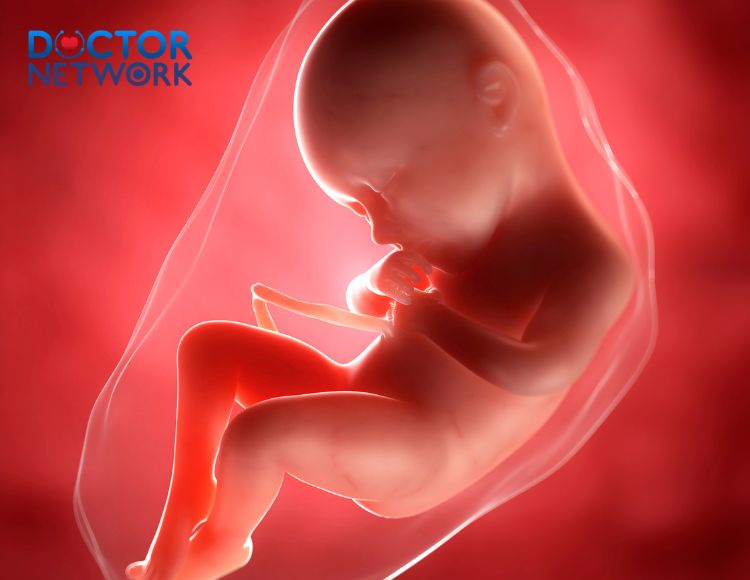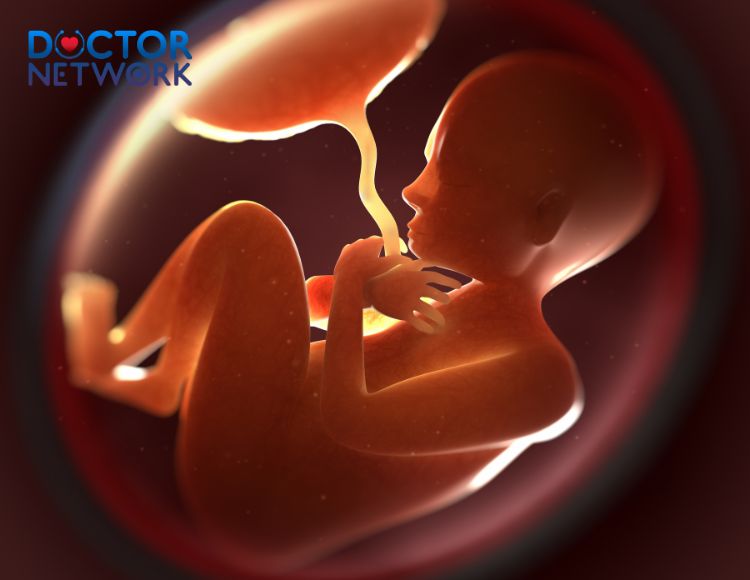Many expectant mothers wonder why, despite drinking plenty of water, the amniotic fluid volume remains unusually low. “Why do I drink lots of water but still have little amniotic fluid?” causes concern and needs to be investigated to find appropriate solutions. This article will help you understand the reasons, effects, and management of this pregnancy phenomenon.

“Why do I drink lots of water but still have little amniotic fluid?” is a common question among expectant mothers.
Amniotic Fluid and the Issue of Drinking Lots of Water but Still Having Little Amniotic Fluid
Amniotic fluid is a clear fluid that surrounds and protects the developing fetus in the mother’s womb. Amniotic fluid plays important roles in:
Allowing the fetus to move freely, supporting skeletal development. Cushioning and protecting the baby from impacts. Aiding in the development of fetal lungs. Maintaining a stable temperature around the baby. Preventing infections. Oligohydramnios is a condition where the volume of amniotic fluid is lower than normal for a specific pregnancy. This can pose risks for both the mother and the fetus.
Why Do I Drink Lots of Water but Still Have Little Amniotic Fluid?
“Why do I drink lots of water but still have little amniotic fluid?” – Drinking enough water is crucial, but it is not the sole factor affecting amniotic fluid volume. Some of the most common reasons for low amniotic fluid despite drinking lots of water include:
- “Why do I drink lots of water but still have little amniotic fluid?” – Maternal dehydration: Conditions such as vomiting, diarrhea, fever, excessive physical activity, etc., can also lead to abnormally low amniotic fluid volume despite maternal efforts to drink water.
- Fetal renal anomalies: The kidneys play a major role in producing urine – an important component of amniotic fluid. Congenital kidney abnormalities (such as underdeveloped kidneys) or impaired renal function of the fetus can lead to low amniotic fluid.
- “Why do I drink lots of water but still have little amniotic fluid?” – Twin-to-twin transfusion syndrome: If the twin-to-twin transfusion does not transfer enough nutrients and fluid from the mother’s body to the fetus, the baby’s development and amniotic fluid production may also be affected.

Twin-to-twin transfusion syndrome is also one of the reasons for “Why do I drink lots of water but still have little amniotic fluid?”
Amniotic leakage or rupture: Premature rupture of membranes (before labor) or amniotic fluid leakage can cause fluid loss, significantly reducing amniotic fluid volume, even if the mother drinks lots of water.
“Why do I drink lots of water but still have little amniotic fluid?” – Maternal health conditions: Maternal health problems may contribute to low amniotic fluid.
Some common conditions include: Pre-eclampsia Gestational diabetes Chronic hypertension Intrauterine growth restriction (IUGR) Chorioamnionitis Impact of Oligohydramnios on the Fetus
“Why do I drink lots of water but still have little amniotic fluid?” – Low amniotic fluid can lead to several dangerous complications for the pregnancy:
- Difficulties in fetal development: Limited space due to low amniotic fluid can hinder the normal development of the fetal skeletal system and lungs.
- Increased risk of umbilical cord compression: The umbilical cord may be compressed between the uterine wall and the fetus, especially during fetal movements.
- Increased risk of preterm birth: Oligohydramnios carries the potential risk of preterm labor, leading to a range of issues for preterm babies.
- Other complications during childbirth: Meconium passage, fetal distress due to poor oxygenation, abnormal fetal presentation, etc.
Diagnosis and Monitoring of “Why Do I Drink Lots of Water but Still Have Little Amniotic Fluid”
Ultrasound: This is the main method to determine oligohydramnios. Indices such as Amniotic Fluid Index (AFI) or Deepest Vertical Pocket (DVP) are parameters used by doctors to assess amniotic fluid volume.
Additional tests: Some tests may be ordered to rule out underlying pathological causes, evaluate the overall health status of the mother and fetus.
Management Approaches for “Why Do I Drink Lots of Water but Still Have Little Amniotic Fluid”
The management plan for oligohydramnios depends on its severity, underlying causes, and gestational age. Some common measures include:
Fluid replacement and close monitoring: Depending on the situation, the doctor may ask the expectant mother to increase fluid intake, receive intravenous fluids to compensate for lost fluid. Additionally, close monitoring of amniotic fluid volume, fetal movements, and other survival indices of the baby.

Increase water intake to overcome the problem of “why do I drink lots of water but still have little amniotic fluid?”
Treating underlying medical conditions: If the cause is related to maternal medical conditions, proper control of these conditions is crucial. For example, controlling blood pressure, blood sugar levels, etc.
Medical interventions: Interventions such as amnioinfusion, fetal surgery may be considered when amniotic fluid is critically low, the fetus is mature enough, or other complications arise.
Advice and Prevention Measures
Regular Prenatal Check-ups: Regular prenatal check-ups help detect oligohydramnios and other abnormalities early in pregnancy. Your doctor will provide appropriate advice based on your condition. Stay Hydrated: Drinking an adequate amount of water every day (about 2 – 2.5 liters) contributes to maintaining a healthy pregnancy and stable amniotic fluid levels. Balanced Nutrition: A nutritious diet rich in essential nutrients is crucial for both the mother and the baby’s growth. Avoid Risk Factors: Avoiding alcohol, tobacco, self-medication, or managing existing chronic illnesses (if any) as directed by your doctor.
Some Frequently Asked Questions About “Why Do I Drink Lots of Water but Still Have Little Amniotic Fluid”
Here are 5 commonly asked questions related to the topic of “Why Do I Drink Lots of Water but Still Have Little Amniotic Fluid” and answers to each question:
How much water should I drink daily to ensure normal amniotic fluid levels?
Answer: Although important, drinking enough water is not the sole factor in ensuring normal amniotic fluid levels. The ideal water intake for each pregnant woman varies, typically ranging from 2 – 2.5 liters per day. It is crucial to monitor amniotic fluid levels through regular prenatal check-ups, while the expectant mother should also maintain adequate hydration (through checking urine color, skin moisture, etc.).
Besides drinking water, are there other ways to increase amniotic fluid?
Answer: In some cases, fluid replacement through intravenous hydration or artificial amnioinfusion may be recommended under the strict guidance and supervision of a specialist doctor. Additionally, a diet rich in fruits, vegetables, and hydrating foods can contribute to increasing fluid intake. Absolutely avoid unproven methods.
Besides risks to the fetus, what problems can the mother encounter if oligohydramnios occurs?
Answer: Oligohydramnios can increase the risk of uterine infection or maternal hemorrhage. In severe cases, oligohydramnios can lead to complications during childbirth such as umbilical cord compression. Therefore, close monitoring of amniotic fluid levels and paying attention to any abnormal signs when experiencing oligohydramnios are crucial for both mother and baby.
After giving birth, can oligohydramnios recur in subsequent pregnancies?
Answer: The risk of oligohydramnios recurrence in subsequent pregnancies depends on the underlying cause of oligohydramnios in the previous pregnancy. If the cause originates from congenital fetal defects, maternal medical conditions, etc., effectively controlling these risk factors can help limit the recurrence of oligohydramnios. Specialist advice will provide specific assessments for each individual case.
What should I do if I suspect oligohydramnios despite drinking plenty of water?
Answer: If you are worried about oligohydramnios despite drinking plenty of water, the best course of action is to promptly visit a reputable healthcare facility for examination. Doctors will use ultrasound to assess amniotic fluid levels. After accurately determining the condition and cause, the doctor will provide the most appropriate management plan for both the mother and the baby.
Some Scientific Evidence Related to “Why Do I Drink Lots of Water but Still Have Little Amniotic Fluid”
Scientific Evidence on “Why Do I Drink Lots of Water but Still Have Little Amniotic Fluid”
- The Role of Amniotic Fluid:
Amniotic fluid plays a crucial role in protecting the fetus, aiding in the development of skeletal, pulmonary, and digestive systems. Amniotic fluid is composed of water, proteins, carbohydrates, fats, electrolytes, and other substances.
- Causes of “Why Do I Drink Lots of Water but Still Have Little Amniotic Fluid”:
Fluid Loss: Maternal dehydration due to vomiting, diarrhea, fever, or excessive physical activity can lead to oligohydramnios. Twin-to-twin Transfusion Syndrome: Poor functioning of the placenta can affect the supply of fluid to the fetus, resulting in oligohydramnios. Congenital Defects: Congenital defects in the fetal kidneys or urinary system can hinder urine production, leading to oligohydramnios. Amniotic Leakage or Rupture: Amniotic fluid leakage or rupture can occur due to various reasons, resulting in oligohydramnios. Other Medical Conditions: Some maternal health conditions such as hypertension, diabetes, or preeclampsia can lead to oligohydramnios.
- Drinking Lots of Water Doesn’t Always Help Increase Amniotic Fluid Levels:
Drinking plenty of water may help increase amniotic fluid levels in some cases but is not always effective. If the cause of oligohydramnios is related to twin-to-twin transfusion syndrome, congenital defects, or amniotic leakage, drinking lots of water may not be helpful. Excessive water intake can lead to water intoxication, so it is important to drink water moderately.
- Scientific Studies:
A study published in the journal “Ultrasound in Obstetrics & Gynecology” showed that drinking lots of water did not help increase amniotic fluid levels in women with oligohydramnios due to early rupture of membranes. Another study published in “The American Journal of Obstetrics and Gynecology” suggested that intravenous fluid infusion may help increase amniotic fluid levels in women with oligohydramnios due to fluid loss. Conclusion:
The condition of “Why Do I Drink Lots of Water but Still Have Little Amniotic Fluid” is not common but causes concern for pregnant women. Visit a reputable healthcare facility for examination if you suspect oligohydramnios, to find the cause and timely management plan, ensuring the safety of both you and your baby. Remember, regular check-ups and specialist advice are crucial throughout pregnancy.
References:
https://my.clevelandclinic.org/health/diseases/22179-oligohydramnioshttps://www.marchofdimes.org/find-support/topics/planning-baby/oligohydramnioshttps://www.webmd.com/baby/what-to-know-about-drinking-water-during-pregnancy
Kiểm Duyệt Nội Dung
More than 10 years of marketing communications experience in the medical and health field.
Successfully deployed marketing communication activities, content development and social networking channels for hospital partners, clinics, doctors and medical professionals across the country.
More than 6 years of experience in organizing and producing leading prestigious medical programs in Vietnam, in collaboration with Ho Chi Minh City Television (HTV). Typical programs include Nhật Ký Blouse Trắng, Bác Sĩ Nói Gì, Alo Bác Sĩ Nghe, Nhật Ký Hạnh Phúc, Vui Khỏe Cùng Con, Bác Sỹ Mẹ, v.v.
Comprehensive cooperation with hundreds of hospitals and clinics, thousands of doctors and medical experts to join hands in building a medical content and service platform on the Doctor Network application.

























